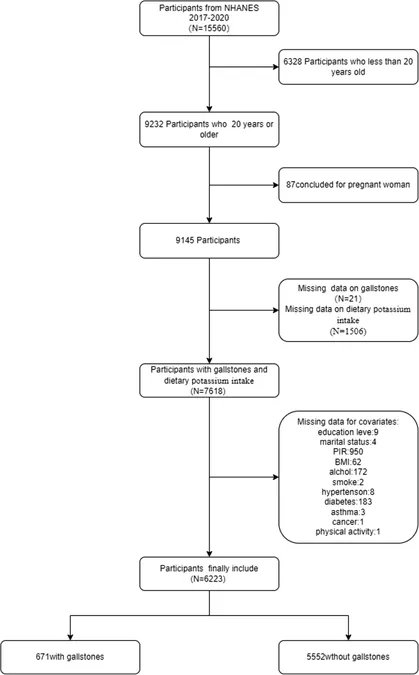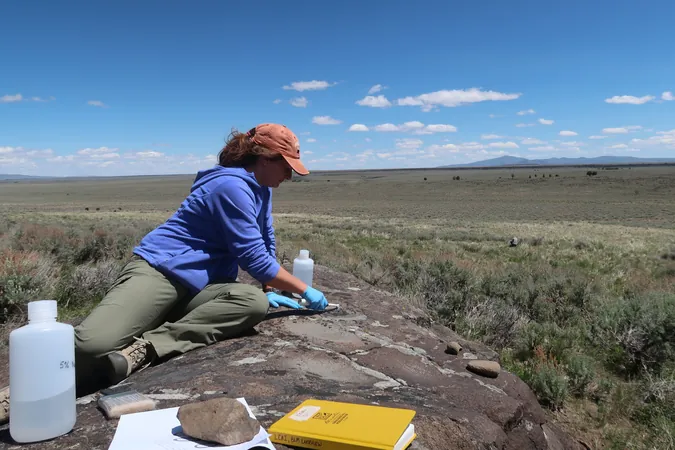
Do Potassium-Rich Diets Hold the Key to Preventing Gallstones in American Adults?
2025-03-24
Author: Wei Ling
Do Potassium-Rich Diets Hold the Key to Preventing Gallstones in American Adults?
The formation of gallstones, primarily found in the gallbladder and bile ducts, remains a significant public health concern, particularly in the United States. They can manifest as asymptomatic or symptomatic issues and are mainly classified into cholesterol stones, bilirubin stones, and mixed stones—79% to 90% of which are cholesterol-based. While gallstones may seem innocuous, they can lead to serious complications, including cholecystitis and pancreatitis, with estimates indicating that 10% of those with gallstones may require surgical intervention.
Interestingly, certain populations are at a higher risk, such as American Indians, where gallstone prevalence can soar between 60% to 70%. In contrast, white Americans typically experience rates between 10% to 15%. As the aging population with increased health risks rises, the burden on healthcare systems is likely to escalate.
Recent findings from the National Health and Nutrition Examination Survey (NHANES) have investigated the often-overlooked connection between dietary potassium intake and gallstone prevalence. Notoriously low in the American diet, potassium's recommended daily intake was set at 4,700 mg, a goal that only 3% of Americans manage to meet. Potassium is critical in preventing several chronic diseases, including hypertension and diabetes, but until now, no substantial evidence linked its consumption directly to gallstone prevention.
The NHANES study highlights an intriguing association—higher dietary potassium intake appears to correlate with a decreased risk of gallstones. Individuals with a higher potassium consumption showed a 19% lower chance of developing gallstones for every additional gram consumed. The study assessed dietary habits, lifestyle choices, and even considered various socio-economic factors when evaluating the data, resulting in a comprehensive analysis of the connection.
Key demographic insights revealed that participants with higher potassium intake were primarily older, male, and more likely to have higher educational qualifications and income levels. They also engaged in healthier lifestyle choices, such as lower smoking rates and greater physical activity.
What’s compelling about this study is its illustrative analysis demonstrating a clear inverse relationship between potassium consumption and gallstone prevalence. Beyond merely establishing this link, it raises essential questions regarding the underlying mechanisms. For instance, how does potassium influence insulin dynamics and cholesterol metabolism, both known contributors to gallstone formation? The potential exists for potassium’s effects on various health aspects to contribute toward gallstone prevention, although further research is vital.
Moreover, this study is groundbreaking in linking dietary potassium and gallstones, an area that has been severely under-researched. Prior studies have explored different minerals but rarely potassium in this specific context. With gallstones influencing many lives and healthcare costs associated with their treatment surging beyond $6.5 billion annually, these findings could usher in new dietary recommendations aimed at prevention.
As we look towards future research, a larger population sample could yield more definitive conclusions. The findings so far suggest that a potassium-rich diet may not only prevent kidney stones—an already established link—but also help protect against gallstones, offering a dual benefit that could have profound implications for public health policies and dietary guidelines.
If you're looking for a simple yet effective means to bolster your health and potentially stave off gallstones, consider boosting your potassium intake through foods rich in this essential nutrient, such as bananas, sweet potatoes, and leafy greens. This may just be the dietary change that paves the way for better gallbladder health!



 Brasil (PT)
Brasil (PT)
 Canada (EN)
Canada (EN)
 Chile (ES)
Chile (ES)
 Česko (CS)
Česko (CS)
 대한민국 (KO)
대한민국 (KO)
 España (ES)
España (ES)
 France (FR)
France (FR)
 Hong Kong (EN)
Hong Kong (EN)
 Italia (IT)
Italia (IT)
 日本 (JA)
日本 (JA)
 Magyarország (HU)
Magyarország (HU)
 Norge (NO)
Norge (NO)
 Polska (PL)
Polska (PL)
 Schweiz (DE)
Schweiz (DE)
 Singapore (EN)
Singapore (EN)
 Sverige (SV)
Sverige (SV)
 Suomi (FI)
Suomi (FI)
 Türkiye (TR)
Türkiye (TR)
 الإمارات العربية المتحدة (AR)
الإمارات العربية المتحدة (AR)